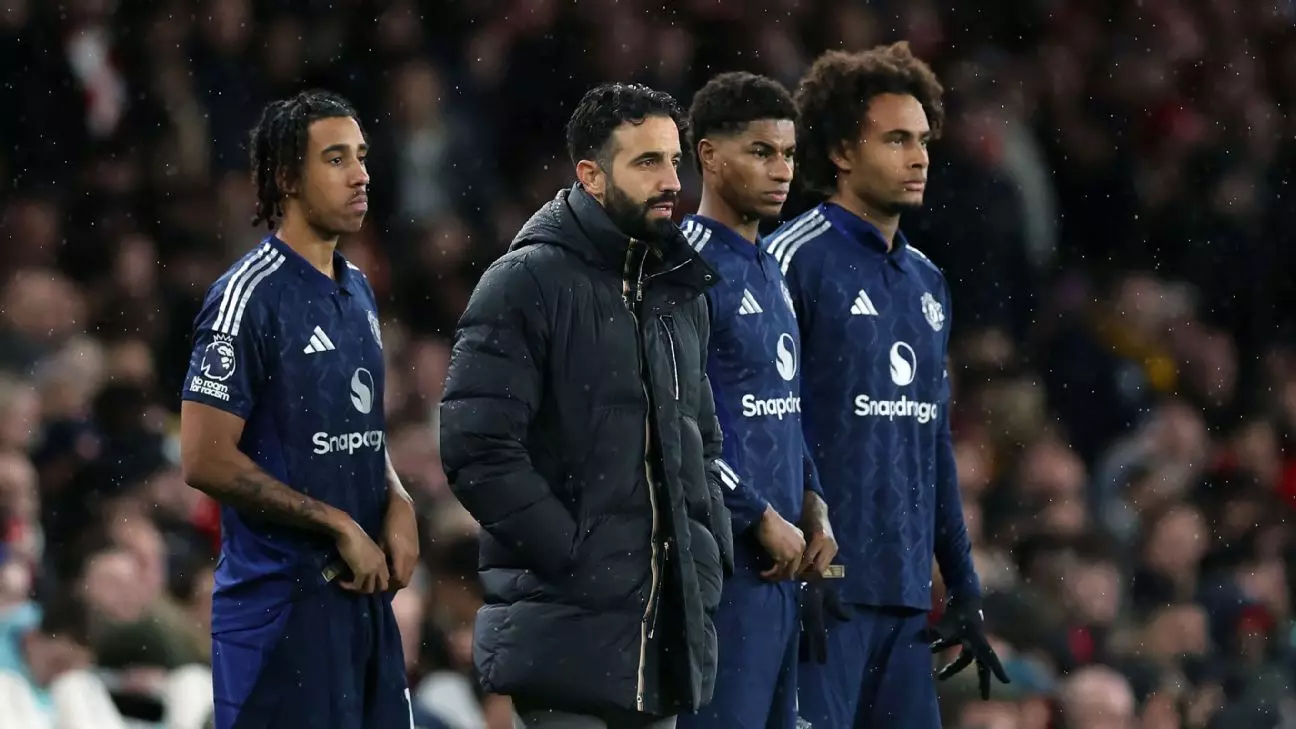In the world of elite football, injuries can significantly impact a team’s performance and a coach’s strategy. Ruben Amorim, the newly appointed head coach of Manchester United, has recently shed light on the serious challenges he faces regarding player fitness. Following his first defeat at the helm of the club—a 2-0 loss to Arsenal—Amorim articulated the constraints he is under in terms of managing players returning from injury, revealing a complex scenario that intertwines tactical decisions with the harsh realities of player health.
Amorim’s struggles are primarily rooted in an injury-laden squad that has hindered his ability to field a fully fit team. Following the match against Arsenal, it became evident that the recent string of injuries has forced him to impose “time limits” on players like Harry Maguire, Tyrell Malacia, and Mason Mount. Each player’s limited participation—none played more than 60 minutes against the Gunners—is a testament to their recovery status and the club’s overall fitness level. Moreover, the much-anticipated debut of summer signing Leny Yoro, who has faced a prolonged absence due to a foot injury, highlights the ongoing challenges in returning players to top form without risking further injuries. This situation raises questions about the club’s medical and conditioning staff, and whether more proactive measures could be taken to ensure player welfare.
Adapting Strategies on the Fly
Faced with these restrictions, Amorim’s tactical philosophy must shift. He maintains a balanced approach, choosing to adapt his methodology according to the capabilities of his players on any given match day. “We have to manage within games,” he noted, indicating that the strategy employed may change to suit the players’ current fitness levels. This dynamic approach, while necessary, inevitably affects the consistency and fluidity of the team’s gameplay, a factor that can pose significant challenges when competing against clubs with a more stable roster.
Moreover, the coach emphasized the importance of assessing players daily, particularly those at risk of aggravated injuries. In an era where the physical demands of the game are ever-increasing, the ability to balance fitness and performance is paramount. “We have to have everybody ready to work, to play, and to improve the squad,” he mentioned. Such demands require not just careful management of players but also a thorough understanding of their physical limits—an aspect that falls heavily on the shoulders of the coaching staff.
Despite the setback against Arsenal, Amorim remains optimistic, stating that there are positives to be gleaned from the performance. This resilience in the face of defeat is essential in sports leadership and reflects a growth mindset that can inspire both players and fans. He noted the discomfort felt by Arsenal as the match unfolded, suggesting that his team demonstrated moments of potential even in a losing effort. Finding silver linings amidst the gloom can help to galvanize the squad, encouraging players to focus on improvement rather than succumbing to the weight of disappointment.
Furthermore, Amorim’s commitment to the long-term recovery of injured players shows a commitment to the overall health of the squad. His approach towards Luke Shaw, who continues to battle injuries after returning from a lengthy absence, signifies a prioritization of player welfare over immediate results. “I will be with him, we will help him to return,” he stated, reinforcing the notion that a player’s well-being is ultimately more crucial than the short-term successes that might come from rushing them back into action.
Ruben Amorim’s challenges at Manchester United encapsulate a broader issue that many clubs face: balancing competitive performance with player health. His revelations post-match not only offer a glimpse into the complexities of football management but also underscore the importance of a strategic approach to injuries. As the season progresses, the success of Amorim’s tenure will likely depend on his ability to navigate these challenges successfully, creating a resilient squad that can meet the rigors of both domestic and international competition.

